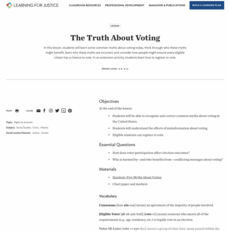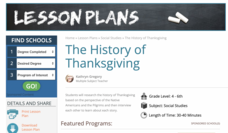Learning for Justice
Change Agents in Our Own Lives
Everyone has the power to change their own lives. Young historians learn how they can become agents for change in their own lives and the community. The lesson focuses on positive role models and what motivates individuals to promote...
Teaching Tolerance
Modern-Day Heroes: People Who Are Making a Difference
Not all superheroes wear capes. An engaging lesson delves into the world of modern-day heroes and activists for change. Academics learn there are many different ways to be a hero as well as explore what makes a person a hero. The...
Teaching Tolerance
Where We Stand
Everyone is entitled to their own opinion. Academics learn strategies to share their opinions and agree or disagree with others in a respectful manner. The resource provides scenarios to help individuals form opinions and share them with...
Teaching Tolerance
Dismantling Racial Caste
It's time to end racism. The final installment of the series encourages scholars to consider what is needed to ended the racial caste system in the U.S. Young historians complete group discussion, written prompt, and a hands-on-activity...
Teaching Tolerance
Parallels Between Mass Incarceration and Jim Crow
Is history repeating itself? A riveting lesson examines the parallels between mass incarceration in the U.S. and the Jim Crow Laws of the past. Academics review Jim Crow Laws and compare them to mass incarcerations of African Americans....
Teaching Tolerance
Understanding the Prison Label
Break the chain. An engaging lesson examines why it is so hard to break free of the prison system in the US. Academics participate in a reader's theater, read primary sources, and discuss their thoughts. The lesson explains the hardships...
Teaching Tolerance
Racial Disparity in the Criminal Justice System
Explore the impact of the war on drugs in a thought-provoking lesson for high school academics. Young historians delve into the world of the criminal justice system and the racial disparity that occurs in the US. The resource provides...
Teaching Tolerance
The War on Drugs—Mechanisms and Effects
The war on drugs doesn't have definite results. An interesting lesson examines the social, political, and economic effect of the war on drugs. Academics learn how the war on drugs has led to mass incarcerations and negatively affected...
Teaching Tolerance
Mass Incarceration as a Form of Racialized Social Control
Mass incarceration: A result of a tough stance on crime or racial discrimination, you decide. Academics explore the history and reasons behind mass incarcerations in the United States and its impact on ethnic communities. The...
Teaching Tolerance
Jim Crow as a Form of Racialized Social Control
Just because slavery was illegal doesn't mean it went away ... Jim Crow Laws took its place. An eye-opening lesson focuses on how Jim Crow Laws were used as a form of racial social control against African Americans in the United States....
Teaching Tolerance
Introducing 'The New Jim Crow'
When Jim Crow Laws ended, the intent behind them did not. Academics read "The New Jim Crow Laws" and an interview from the author to understand how racism has not ended, but rather changed over time. The lesson explains how prejudices in...
Teaching Tolerance
Talking About Race and Racism
Set the stage for discussion in a thought-provoking instructional activity on racism. An informative resource prepares scholars to discuss the history of race and racism with a quiz, vocabulary, and guidelines. Academics discuss topics...
Teaching Tolerance
The True History of Voting Rights
Explore what voting rights really are in an intriguing lesson plan that explores the history of American voting. The resource examines the timeline of voting rights in the United States with group discussions, hands-on-activities, and...
Teaching Tolerance
The Truth About Voting
True or False: Only Presidential elections matter. Academics delve into common voting myths to understand what is true and why the election process is critical to democracy. The lesson uses group discussion, activities, and handouts to...
Teacher.org
The History of Thanksgiving
The first Thanksgiving is the focus of a lesson that boosts reading comprehension and interview skills. Half the class reads about Pilgrims while the other half reads about the Native American, Squanto. After answering questions, pupils...
National Endowment for the Humanities
Treaty Negotiations
Let's make a deal! Drawing on work in previous unit lessons, young scholars negotiate favorable trade treaties with other nations during the early Modern Empire Era. Their work relies on previously completed activities, as well as...
National Endowment for the Humanities
Planning for Treaty Negotiations
The party is over. Now it's time to get to work! Learners acting as agents for a country during the modern Age of Empires develop proposals to negotiate trade deals between the rising global powers. Using research from previous lessons,...
National Endowment for the Humanities
Hosting a Diplomatic Reception
The toasts are written, the table is set: it's time to party! Young scholars use a role-playing activity to go toast to toast. After researching and writing toasts for their allied countries during the modern Age of Empires, individuals...
National Endowment for the Humanities
Writing a Diplomatic Toast
Here's to you! Using a role-playing activity and primary source analysis, learners discover the importance of diplomacy. Impersonating a diplomat from a great empire, they write a toast to another empire, analyzing the strengths and...
National Endowment for the Humanities
Analyzing “Intercepted Intelligence”
A good diplomat needs to know how world events can affect their country. First, class members examine the Papal Bull that excommunicated Queen Elizabeth I from the Roman Catholic Church. Then, learners playing the role of diplomat from...
National Endowment for the Humanities
Empire Intelligence Briefings
To trade or not to trade. Young diplomats put their country's best foot forward in a series of briefings for other countries about their nations. The goal is to persuade others to engage in diplomacy and trade. Using a previous lesson...
National Endowment for the Humanities
Learning about Early Modern Era Empires
You are a diplomat during the Age of Empire: prepare a briefing about your country. Young scholars take on the challenge using a role-play exercise to examine various empires during the rise of global interconnectedness. Materials...
National Endowment for the Humanities
Frederick Douglass’s Narrative: Myth of the Happy Slave
The firsthand accounts of what it was like to be an enslaved person in the mid-1800s riveted a nation and the issue ultimately led to civil war. Using excerpts from Frederick Douglass's autobiography, budding historians examine what it...
National Endowment for the Humanities
The Power of the Majority over Thought
While Alexis de Tocqueville mourned a lack of "freedom of discussion" in America in the early republic, today's pupils are concerned about peer pressure. Using excerpts of de Tocqueville's writing and discussion questions, scholars...

























